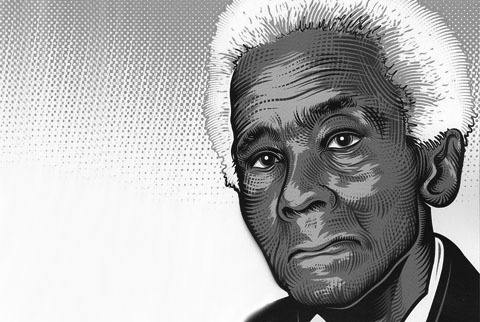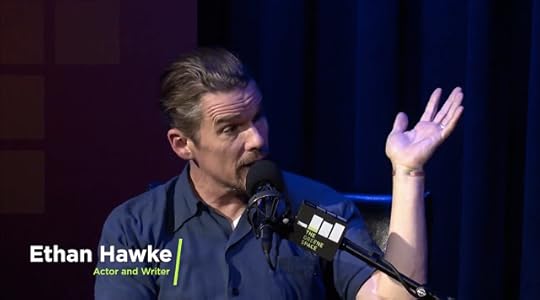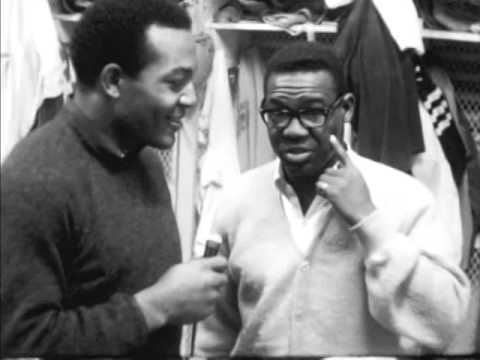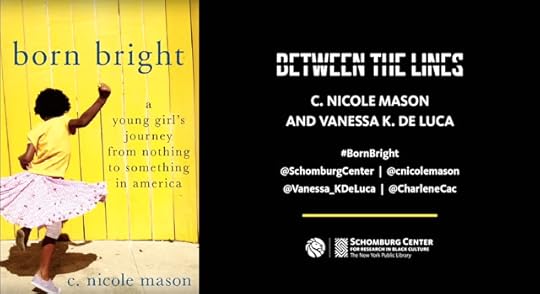Mark Anthony Neal's Blog, page 572
October 12, 2016
Clarify: Talib Kweli Discusses Gun Culture + Hip Hop
 ''The U.S. has more guns per capita than any nation on earth. We also have the most gun deaths of any developed country. But what can we do about it? Baratunde Thurston and Luke Brinker talk with Talib Kweli about the issue of guns in America.' --
Mic
''The U.S. has more guns per capita than any nation on earth. We also have the most gun deaths of any developed country. But what can we do about it? Baratunde Thurston and Luke Brinker talk with Talib Kweli about the issue of guns in America.' --
Mic
Published on October 12, 2016 04:18
October 10, 2016
The Missing Gospel of CLR James by Lawrence Ware + Paul Buhle
 C.L.R. James. Image courtesy AK PressThe Missing Gospel of CLR Jamesby Lawrence Ware + Paul Buhle | NewBlackMan (in Exile)
C.L.R. James. Image courtesy AK PressThe Missing Gospel of CLR Jamesby Lawrence Ware + Paul Buhle | NewBlackMan (in Exile)Looking back on childhood in Trinidad, CLR James called himself the “little Puritan.” His family, jet-black descendants of slaves, carried themselves with the utmost dignity. His father, the schoolmaster, with suit and tie, his mother and distinguished aunts, dressing up with special effort for church, that is, “C of E.” Like other Episcopalians of the colonies, come of age late enough to remember slavery in a grandparent but also dress, talk, enjoy literature and music and even themselves dance in modern, early twentieth-century fashion, the Jameses had a culture of religion or a religion of culture at the center of their lives.
For “Nello,” a diminutive bestowed upon him by an encouraging mother, the moral code embedded in Church allowed him to shrug off racial disparagement or discrimination. These existed but would not hold him back. After he reached his teens, the theological core shriveled down, but the moral code remained. And there was something more.
In a 1960 series of lectures at the public library in Port of Spain, Trinidad, where James had temporarily resettled at the call of his former student and soon premier, Eric Williams, James explained. His own historical world began with Greece, the early democracy, philosophy and drama (including sports), but proceeded to Rome and the colonies. There, the Bible’s St. John had predicted, in the mystical “Revelations,” the course of Empire’s Fall. “He was a Jew whose country was ruled by the Romans; and he was anti-imperialist and anti-colonialist.” In the vivid pages of the Bible, the erstwhile Little Puritan suggested, lay the prediction for the Fall of modern empires, specifically British and American. It was not the anti-imperialism alone, but “the strength of his vision, his grasp of fundamentals, and his kinship, despite the peculiar form that he used, with great philosophers like Plato or Aristotle.” An extraordinary statement: James read Revelations as a prose poem.
Christianity, he insisted repeatedly, had been in its beginning a rebellious religion that promised its followers equality after death. Recent historians have been at pains to note the wealthy Christians who lost no time using the new religion as a means of pacifying a restless slave population. But this evidence is no disproof of the larger phenomenon. Christianity arrived amidst Empire and was swallowed up by Empire, but not without large adjustments.
For James, the Victorian Englishman (such was his training, with Thackeray’s Vanity Fair his first literary clue to the absurdities of class society), the class revolts in seventeenth century England had been decisive in modern society. Something like a bourgeoisie pushed aside the Royals. But not without religion—varieties of Christianity, at the center of the picture. Catholics (the crown) versus Presbyterians (the gentry) argued in theological terms the class struggle emerging. Cromwell’s New Model Army, unwontedly setting in motion the Levellers and even the Diggers, brought a more radical democratic impulse to the surface. The Leveller Party leaders, including the revolutionary journalist Richard Overton, offered the first versions of what would become arguments for democracy. These were Christian arguments and could not have been otherwise.
Religion offered a form and format for understanding the world and overcoming class society. James had said so clearly in his History of the Negro Revolt (1938), looking at African anti-imperialist uprisings that might well take the form of seemingly strange religious ideologies (even the followers of the Salvation Army) but were political to the core. Failure to understand the religious impulse would be dangerous, failure to see the political impulse beneath would be fatal.
Christianity, a James long separated from church-going observed, suggested if it did not specify or monopolize the quest for freedom. No matter how long or successfully that quest had been perverted. And freedom, not material wealth, had been the human impulse driving history forward, despite everything. Other religions had much to contribute, positively and negatively. But for James, Christianity was central to the history of the West—and the history of the slaves; yet, Black American Christianity finds itself at a crossroads. The rise of a gospel wedded to capitalistic definitions of blessedness has infiltrated many black churches to disastrous results.
In prosperity theology, the notion of communal liberation from social oppression has been combined with capitalistic notions of individualized wealth creation. As a result, liberation now means access to wealth and social status—but this is not new.
In the 1970s and 1980s, Kenneth Copeland, Frederick Price, and Kenneth Hagin used the burgeoning platform of televangelism to popularize a problematic conception of the gospel. Contemporarily, preachers like T.D. Jakes, Joel Osteen, and Creflo Dollar articulate a version of the prosperity gospel grounded in a postmodern, self-help hermeneutic to millions of people.When oppressed people are told that God wants them to be “blessed and highly favored” or that they need to “take back what the devil stole from them,” they are being fed the idea that capitalistic gains are the goal of religious life. Grace is measured by the size of one’s bank account, and faith is determined by one’s ability to attain creature comforts. Creflo Dollar has gone so far as to say that the only way one can have influence in America is through signs of wealth, and that is part of the reason why he needed a new multimillion-dollar jet. (God would clearly be displeased if a preacher flew coach.)Thousands of black preachers saw the success of this type of preaching, and were influenced by its message. As a result, many black churches are so tied to an understanding of blessedness and liberation grounded in personal success that they have difficulty galvanizing collective social action. On any given Sunday, a version of the prosperity gospel is preached from hundreds of black pulpits. This mishandling of the gospel keeps many black Christians from thinking productively about communal social liberation. James remained critical of Christianity, but, nevertheless, saw its revolutionary potentiality. When recounting a meeting with Martin Luther King, Jr. in a letter, he wrote approvingly of how his preaching “always emphasized a social gospel, that is to say preaching with an emphasis on the improvement of the social situation of the community, and not with the emphasis on individual salvation.”
Black churches must eschew the notions of evangelism emphasized by white Southern Baptists and see work in the community addressing social sins as an embodiment of social evangelism. Individualist spirituality will not liberate us from social oppression—the church must do that work by advocating for policy and protesting in the streets.
CLR James, while not a Christian, has much to teach the Black American Christian Church today.
+++
Paul Buhle, the authorized biographer of C.L.R. James, is retired from teaching history at Brown University and has produced a dozen nonfiction graphic novels in the last ten years.
Lawrence Ware is an Oklahoma State University Division of Institutional Diversity fellow. He teaches in OSU’s philosophy department and is the diversity coordinator for its Ethics Center. A frequent contributor to Counterpunch and Dissent magazine, he is also a contributing editor of NewBlackMan (in Exile) and the Democratic Left. He has been a commentator on race and politics for HuffPost Live, NPR’s Talk of the Nation and PRI’s Flashpoint. Follow him on Twitter.
Published on October 10, 2016 18:07
#ProfessionalBlackGirl - Episode 5: Akiba Solomon
Published on October 10, 2016 02:42
Ethan Hawke on Why Diversity in Casting Makes Better Art
 'Actor and writer Ethan Hawke joined WNYC's Rebecca Carroll for the launch of her new series exploring language and race, "How I Got Over."' -- +The Greene Space at WNYC & WQXR
'Actor and writer Ethan Hawke joined WNYC's Rebecca Carroll for the launch of her new series exploring language and race, "How I Got Over."' -- +The Greene Space at WNYC & WQXR
Published on October 10, 2016 02:26
Nigerian American Artist Njideka Akunyili Crosby on Contemporary Cosmopolitan Black Identity
 'Drawing on art historical, political and personal references, Njideka Akunyili Crosby creates densely layered figurative compositions that, precise in style, nonetheless conjure the complexity of contemporary experience. Akunyili Crosby was born in Nigeria, where she lived until the age of sixteen. In 1999 she moved to the United States, where she has remained since that time. Her cultural identity combines strong attachments to the country of her birth and to her adopted home, a hybrid identity that is reflected in her work.' -- +Tate
'Drawing on art historical, political and personal references, Njideka Akunyili Crosby creates densely layered figurative compositions that, precise in style, nonetheless conjure the complexity of contemporary experience. Akunyili Crosby was born in Nigeria, where she lived until the age of sixteen. In 1999 she moved to the United States, where she has remained since that time. Her cultural identity combines strong attachments to the country of her birth and to her adopted home, a hybrid identity that is reflected in her work.' -- +Tate
Published on October 10, 2016 02:21
October 9, 2016
Jason Moran + George E. Lewis -- In Conversation + In Performance
 'Composer, performer, and music theorist George E. Lewis joins Kennedy Center Artistic Director for Jazz Jason Moran in a special performance celebrating the 35th anniversary of the MacArthur Fellows program. Lewis and Moran are both past MacArthur Fellows, named in 2002 and 2010, respectively. After the performance, Lewis and Moran will engage in public conversation about their concentrations.'
'Composer, performer, and music theorist George E. Lewis joins Kennedy Center Artistic Director for Jazz Jason Moran in a special performance celebrating the 35th anniversary of the MacArthur Fellows program. Lewis and Moran are both past MacArthur Fellows, named in 2002 and 2010, respectively. After the performance, Lewis and Moran will engage in public conversation about their concentrations.'
Published on October 09, 2016 20:01
Bias Isn't Just A Police Problem, It's A Preschool Problem
 'A new study by researchers at Yale found that pre-K teachers, White and Black alike, spend more time watching black boys -- expecting trouble. NPR's Cory Turner reports.' -- +NPR
'A new study by researchers at Yale found that pre-K teachers, White and Black alike, spend more time watching black boys -- expecting trouble. NPR's Cory Turner reports.' -- +NPR
Published on October 09, 2016 19:45
Black Folk Don't: Listen to Classical Music
 'Musicians and fans add their voices to the chorus in this episode: Do Black folk listen to classical music?' -- +BlackFolkDont
'Musicians and fans add their voices to the chorus in this episode: Do Black folk listen to classical music?' -- +BlackFolkDont
Published on October 09, 2016 19:36
From Walter Beach to Colin Kaepernick -- Black Radicals in Sports
 'Host Dave Zirin is joined by Dr. Walter Beach, starter on the Cleveland Browns 1964 Championship team and member of the famed Muhammad Ali Summit about the politics of sports and racism. Zirin also talks with Colin Kaepernick comments about the Trump=Clinton elections, the gorilla taking the field with an All Lives Matter sign, and we have a Just Stand Up award for a player released from the NFL after taking a knee in London, and the East Carolina band.' -- Edge of Sports
'Host Dave Zirin is joined by Dr. Walter Beach, starter on the Cleveland Browns 1964 Championship team and member of the famed Muhammad Ali Summit about the politics of sports and racism. Zirin also talks with Colin Kaepernick comments about the Trump=Clinton elections, the gorilla taking the field with an All Lives Matter sign, and we have a Just Stand Up award for a player released from the NFL after taking a knee in London, and the East Carolina band.' -- Edge of Sports
Published on October 09, 2016 05:04
Between the Lines: C. Nicole Mason and Vanessa K. De Luca
 'Born Bright: A Young Girl's Journey from Nothing to Something in America is a memoir that explores the meaning and shifting narratives of black girlhood and womanhood in a contemptuous America. Author C. Nicole Mason, PhD and Vanessa DeLuca, Editor-In-Chief of ESSENCE Magazine, discussed the book at this Between the Lines program that featured a reading by Charlene Carruthers, Executive Director of BYP100.'
'Born Bright: A Young Girl's Journey from Nothing to Something in America is a memoir that explores the meaning and shifting narratives of black girlhood and womanhood in a contemptuous America. Author C. Nicole Mason, PhD and Vanessa DeLuca, Editor-In-Chief of ESSENCE Magazine, discussed the book at this Between the Lines program that featured a reading by Charlene Carruthers, Executive Director of BYP100.'
Published on October 09, 2016 04:44
Mark Anthony Neal's Blog
- Mark Anthony Neal's profile
- 30 followers
Mark Anthony Neal isn't a Goodreads Author
(yet),
but they
do have a blog,
so here are some recent posts imported from
their feed.




